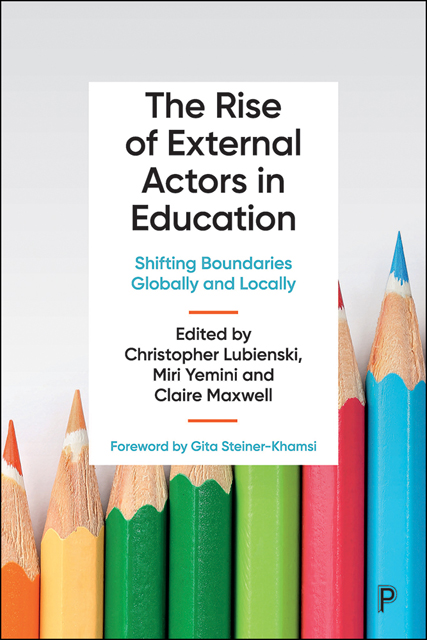Book contents
- Frontmatter
- Contents
- List of figures and tables
- Notes on contributors
- Foreword
- Introduction
- 1 Collective parental involvement: an in-between actor
- 2 When teachers become the external actor: private tutoring and endogenous privatisation in Cambodia
- 3 Cross-sectoral alliances in charter schools: the role of boards of directors from for-profit and non-profit sectors
- 4 A communitarian framework for understanding the relations between schools and NGOs
- 5 PISA for sale? Creating profitable policy spaces through the OECD’s PISA for Schools
- 6 Historical reconfigurations of internal/external actors in Danish educational testing practices
- 7 A short history of external agency involvement within education in contemporary Poland
- 8 New philanthropy in the heterarchical governance of education in Brazil
- 9 Venture philanthropy and the rise of external actors in Australian education
- 10 Power struggle in education policy change: the role of knowledge actors in structural reforms in Chile
- Conclusion: Complexity and intentionality of external actors in education
- Index
Introduction
Published online by Cambridge University Press: 13 October 2022
- Frontmatter
- Contents
- List of figures and tables
- Notes on contributors
- Foreword
- Introduction
- 1 Collective parental involvement: an in-between actor
- 2 When teachers become the external actor: private tutoring and endogenous privatisation in Cambodia
- 3 Cross-sectoral alliances in charter schools: the role of boards of directors from for-profit and non-profit sectors
- 4 A communitarian framework for understanding the relations between schools and NGOs
- 5 PISA for sale? Creating profitable policy spaces through the OECD’s PISA for Schools
- 6 Historical reconfigurations of internal/external actors in Danish educational testing practices
- 7 A short history of external agency involvement within education in contemporary Poland
- 8 New philanthropy in the heterarchical governance of education in Brazil
- 9 Venture philanthropy and the rise of external actors in Australian education
- 10 Power struggle in education policy change: the role of knowledge actors in structural reforms in Chile
- Conclusion: Complexity and intentionality of external actors in education
- Index
Summary
Across the globe, public schooling systems are experiencing the growing influence of external agents shaping articulation, provision, policies, and outcomes of education. Academies and charter schools, parental choice, contracting out, public-private partnerships, for-profit providers, benefit corporations, heterarchical governance, venture philanthropies, and many other examples – most of which are new in either form or the extent of their influence permeability – all speak to increasing permeability of public policy making to private interests. This is typically designed by policy elites and is directly aligned with the global movement toward liberalisation, the increasing privatisation of state-dominated sectors, and a general encouragement of private enterprise to solve societal challenges (for example, Osborne & Gaebler, 1992). And most observers would note the growing scale of these players. Trends such as the remarkable growth of privately funded think tanks and philanthropies have fuelled policy networks that promote private, non-state actors in education, whether through structural adjustment policies, public-private partnerships, the proliferation of low-fee schools, charter chains, and multi-academy trusts, or wholesale transference of state schools to private hands (Rich, 2004; Reckhow, 2013; Srivastava, 2016; Verger et al, 2016; Reckhow & Tompkins-Stange, 2018). While we are not so naive as to imagine a previous era of democratically run schools provided by a beneficent state, few would doubt the remarkable rise of the role and influence of these actors in recent times.
Just as the growth of these actors and their influence deserves attention, so too does the diversification of the range of such actors. While traditionally these ‘external actors’ were distinguished as belonging either to the forprofit or the non-profit sectors (Ball & Junemann, 2012), this book raises questions as to whether such categorisations can still capture the diversity of external actors in the field of education. Even as the increasing role of private, non-state actors in public policy making is immensely significant, the diversification of types of actors to include myriad forms – quasi-state agencies, subsidised community groups, impact investors and philanthropies, and so on – also represents an increasingly important area of inquiry.
- Type
- Chapter
- Information
- The Rise of External Actors in EducationShifting Boundaries Globally and Locally, pp. 1 - 9Publisher: Bristol University PressPrint publication year: 2022



